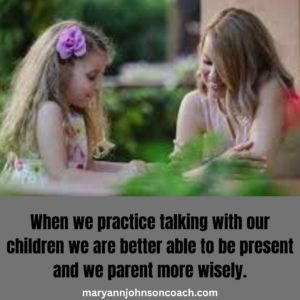 6 Tips for Talking With Kids
6 Tips for Talking With Kids
I have had some GREAT conversations with kids. There are always opportunities to practice this skill, and it is a skill. Part of the reason I have these great conversations is that I work at keeping the conversation going. I want to talk with them, I want to know what they think and feel about what is going on in their lives. I want to know them better. That is what makes a great conversationalist with kids of all ages.
How to keep the conversation going
A conversation goes much farther with a child when we do not impart our judgments or opinions. There is great value in focusing on a child’s feelings or reactions in any given situation rather than sharing what we think or feel. When we can listen without judgment, it helps kids process their emotions.
I laugh when I think of a conversation that a friend shared. She was riding in the car with her teenage daughter, and it went something like this:
“Mom”.
“What?”
“I don’t think I should have a baby now.”
“Is this a consideration?”
“I thought about it, but now I’ve realized something.”
“What’s that?”
“I only really want to buy lots of cute little baby shoes.”
“Oh, that’s very different from having a real baby.”
“Yeah, that’s what I think too.”
When this mom listened calmly, without judgment or sharing her own opinion, she found out what was really going on. It was all about cute baby shoes and not sex. She learned something about her daughter. The conversation lasted long enough to know what her daughter was really thinking.
Here is another example of listening without judgment or opinion.
“Mom, I don’t like David.”
“Hmm, why not?”
“He is dumb.”
“What happened to make you think that?”
“He pushed me off the swing.”
“Oh really? How was that for you?”
“Not good! I really wanted to swing, and it hurt my leg.”
“You didn’t get to swing.”
“No, and that wasn’t nice!”
“You got hurt?”
“Yeah! I would never do that to someone!”
Right after the words, “Mom, I don’t like David,” this mom could have begun a mini-lecture on why it isn’t nice to talk mean about our friends, and then she wouldn’t have discovered what her son was feeling or had experienced.
6 TIPS FOR TALKING WITH KIDS
- Ask open-ended questions. “How did that work out? How do you feel about that? What do you think you can do? How was that for you?
- Don’t offer your opinion.
- Give fewer judgments.
- Say fewer words.
- Help kids find their own feelings about their experiences.
- Rather than tell, ask.
These tips will help your child develop emotional awareness and a strong inner compass. It will help them choose their behavior even when no one is there to evaluate and give them feedback. There is always time to revisit a conversation if teaching is needed, but for now, listen, be interested, and ask good questions.







